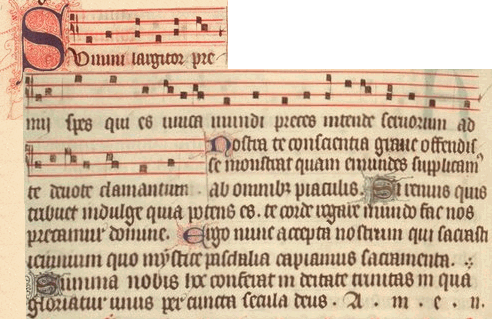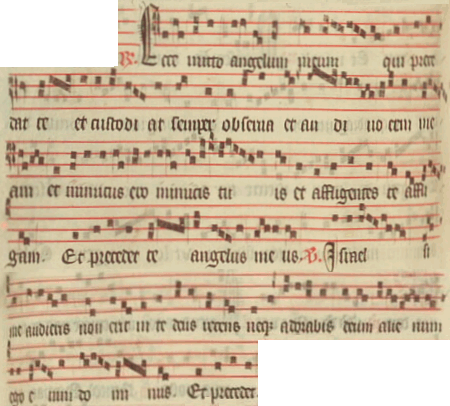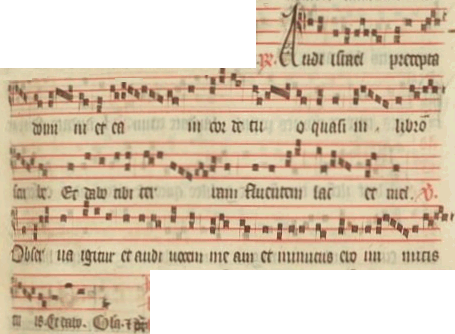READINGS: LENT SUNDAY IV

Invitatory Psalm & BACK

PSALMS and BACK
τὰ ῥήματα σου πνεῦμά ἐστιν καὶ ζωή ἐστιν. — σὺ εἶ ὁ ἅγιος τοῦ θεοῦ.
Even Years: Leviticus 8:1-17; 9:22-24 וַיְדַבֵּר יְהוָה אֶל־מֹשֶׁה לֵּאמֹר׃ קַח אֶת־אַהֲרֹן וְאֶת־בָּנָיו אִתּוֹ וְאֵת הַבְּגָדִים וְאֵת שֶׁמֶן הַמִּשְׁחָה וְאֵת פַּר הַחַטָּאת וְאֵת שְׁנֵי הָאֵילִים וְאֵת סַל הַמַּצּוֹת׃ וְאֵת כָּל־הָעֵדָה הַקְהֵל אֶל־פֶּתַח אֹהֶל מוֹעֵד׃ וַיַּעַשׂ מֹשֶׁה כַּאֲשֶׁר צִוָּה יְהוָה אֹתוֹ וַתִּקָּהֵל הָעֵדָה אֶל־פֶּתַח אֹהֶל מוֹעֵד׃ וַיֹּאמֶר מֹשֶׁה אֶל־הָעֵדָה זֶה הַדָּבָר אֲשֶׁר־צִוָּה יְהוָה לַעֲשׂוֹת׃ וַיַּקְרֵב מֹשֶׁה אֶת־אַהֲרֹן וְאֶת־בָּנָיו וַיִּרְחַץ אֹתָם בַּמָּיִם׃ וַיִּתֵּן עָלָיו אֶת־הַכֻּתֹּנֶת וַיַּחְגֹּר אֹתוֹ בָּאַבְנֵט וַיַּלְבֵּשׁ אֹתוֹ אֶת־הַמְּעִיל וַיִּתֵּן עָלָיו אֶת־הָאֵפֹד וַיַּחְגֹּר אֹתוֹ בְּחֵשֶׁב הָאֵפֹד וַיֶּאְפֹּד לוֹ בּוֹ׃ וַיָּשֶׂם עָלָיו אֶת־הַחֹשֶׁן וַיִּתֵּן אֶל־הַחֹשֶׁן אֶת־הָאוּרִים וְאֶת־הַתֻּמִּים׃ וַיָּשֶׂם אֶת־הַמִּצְנֶפֶת עַל־רֹאשׁוֹ וַיָּשֶׂם עַל־הַמִּצְנֶפֶת אֶל־מוּל פָּנָיו אֵת צִיץ הַזָּהָב נֵזֶר הַקֹּדֶשׁ כַּאֲשֶׁר צִוָּה יְהוָה אֶת־מֹשֶׁה׃ וַיִּקַּח מֹשֶׁה אֶת־שֶׁמֶן הַמִּשְׁחָה וַיִּמְשַׁח אֶת־הַמִּשְׁכָּן וְאֶת־כָּל־אֲשֶׁר־בּוֹ וַיְקַדֵּשׁ אֹתָם׃ וַיַּז מִמֶּנּוּ עַל־הַמִּזְבֵּחַ שֶׁבַע פְּעָמִים וַיִּמְשַׁח אֶת־הַמִּזְבֵּחַ וְאֶת־כָּל־כֵּלָיו וְאֶת־הַכִּיֹּר וְאֶת־כַּנּוֹ לְקַדְּשָׁם׃ וַיִּצֹק מִשֶּׁמֶן הַמִּשְׁחָה עַל רֹאשׁ אַהֲרֹן וַיִּמְשַׁח אֹתוֹ לְקַדְּשׁוֹ׃ וַיַּקְרֵב מֹשֶׁה אֶת־בְּנֵי אַהֲרֹן וַיַּלְבִּשֵׁם כֻּתֳּנֹת וַיַּחְגֹּר אֹתָם אַבְנֵט וַיַּחֲבֹשׁ לָהֶם מִגְבָּעוֹת כַּאֲשֶׁר צִוָּה יְהוָה אֶת־מֹשֶׁה׃ וַיַּגֵּשׁ אֵת פַּר הַחַטָּאת וַיִּסְמֹךְ אַהֲרֹן וּבָנָיו אֶת־יְדֵיהֶם עַל־רֹאשׁ פַּר הַחַטָּאת׃ וַיִּשְׁחָט וַיִּקַּח מֹשֶׁה אֶת־הַדָּם וַיִּתֵּן עַל־קַרְנוֹת הַמִּזְבֵּחַ סָבִיב בְּאֶצְבָּעוֹ וַיְחַטֵּא אֶת־הַמִּזְבֵּחַ וְאֶת־הַדָּם יָצַק אֶל־יְסוֹד הַמִּזְבֵּחַ וַיְקַדְּשֵׁהוּ לְכַפֵּר עָלָיו׃ וַיִּקַּח אֶת־כָּל־הַחֵלֶב אֲשֶׁר עַל־הַקֶּרֶב וְאֵת יֹתֶרֶת הַכָּבֵד וְאֶת־שְׁתֵּי הַכְּלָיֹת וְאֶת־חֶלְבְּהֶן וַיַּקְטֵר מֹשֶׁה הַמִּזְבֵּחָה׃ וְאֶת־הַפָּר וְאֶת־עֹרוֹ וְאֶת־בְּשָׂרוֹ וְאֶת־פִּרְשׁוֹ שָׂרַף בָּאֵשׁ מִחוּץ לַמַּחֲנֶה כַּאֲשֶׁר צִוָּה יְהוָה אֶת־מֹשֶׁה׃ וַיִּשָּׂא אַהֲרֹן אֶת־יָדוֹ אֶל־הָעָם וַיְבָרְכֵם וַיֵּרֶד מֵעֲשֹׂת הַחַטָּאת וְהָעֹלָה וְהַשְּׁלָמִים׃ וַיָּבֹא מֹשֶׁה וְאַהֲרֹן אֶל־אֹהֶל מוֹעֵד וַיֵּצְאוּ וַיְבָרֲכוּ אֶת־הָעָם וַיֵּרָא כְבוֹד־יְהוָה אֶל־כָּל־הָעָם׃ וַתֵּצֵא אֵשׁ מִלִּפְנֵי יְהוָה וַתֹּאכַל עַל־הַמִּזְבֵּחַ אֶת־הָעֹלָה וְאֶת־הַחֲלָבִים וַיַּרְא כָּל־הָעָם וַיָּרֹנּוּ וַיִּפְּלוּ עַל־פְּנֵיהֶם׃ | 1 Yahweh spoke to Moses and said: 2 'Take Aaron and with him his sons, the vestments, the anointing oil, the bull for the sacrifice for sin, the two rams and the basket of unleavened bread. 3 Then call the whole community together at the entrance to the Tent of Meeting.' 4 Moses did as Yahweh ordered; the community gathered at the entrance to the Tent of Meeting, 5 and Moses said to them, 'This is what Yahweh has ordered to be done.' 6 He made Aaron and his sons come forward and washed them with water. 7 He then dressed him in the tunic, passed the waistband round his waist, vested him in the robe and put the ephod on him. He then put the waistband of the ephod round his waist, fastening it to him. 8 He put the breastplate on him, and placed the urim and thummim in it. 9 He put the turban on his head, and on the front of the turban, the golden flower; this was the symbol of holy consecration, which Yahweh had prescribed to Moses. 10 Moses then took the anointing oil and anointed the Dwelling and everything inside it, to consecrate them. 11 He sprinkled the altar seven times and anointed the altar and its accessories, the basin and its stand, to consecrate them. 12 He then poured some of the anointing oil on Aaron's head and anointed him to consecrate him. 13 Moses then made Aaron's sons come forward; he dressed them in tunics, passed the waistbands round their waists and put on their head-dresses, as Yahweh had ordered him. 14 He then had the bull for the sacrifice for sin brought forward. Aaron and his sons laid their hands on the victim's head 15 and Moses slaughtered it. He then took the blood and with his finger put some of it on the horns on the corners of the altar to purify the altar. He then poured the rest of the blood at the foot of the altar, which he consecrated by performing the rite of expiation over it. 16 He then took all the fat covering the entrails, the mass of fat over the liver, both kidneys and their fat; and he burnt this on the altar, 17 but the bull's skin, its meat and its offal he burnt outside the camp, as Yahweh had ordered Moses. 9:22 Aaron then raised his hands towards the people and blessed them. Having thus performed the sacrifice for sin, the burnt offering and the communion sacrifice, he came down 23 and entered the Tent of Meeting with Moses. Then they came out together to bless the people and the glory of Yahweh appeared to the entire people: 24 a flame leapt out from Yahweh's presence and consumed the burnt offering and fat on the altar. At this sight the entire people shouted for joy and fell on their faces. | |||||||||||||
Odd Years: Hebrews 7:1-13 οὗτος
γὰρ ὁ Μελχισέδεκ,
βασιλεὺς Σαλήμ,
ἱερεὺς τοῦ
θεοῦ τοῦ
ὑψίστου,
1 Melchizedek, king of Salem, a priest of God Most High, came to meet Abraham when he returned from defeating the kings, and blessed him; 2 and Abraham gave him a tenth of everything. By the interpretation of his name, he is, first, 'king of saving justice' and also king of Salem, that is, 'king of peace'; 3 he has no father, mother or ancestry, and his life has no beginning or ending; he is like the Son of God. He remains a priest for ever. 4 Now think how great this man must have been, if the patriarch Abraham gave him a tenth of the finest plunder. 5 We know that any of the descendants of Levi who are admitted to the priesthood are obliged by the Law to take tithes from the people, that is, from their own brothers although they too are descended from Abraham. 6 But this man, who was not of the same descent, took his tithe from Abraham, and he gave his blessing to the holder of the promises. 7 Now it is indisputable that a blessing is given by a superior to an inferior. 8 Further, in the normal case it is ordinary mortal men who receive the tithes, whereas in that case it was one who is attested as being alive. 9 It could be said that Levi himself, who receives tithes, actually paid tithes, in the person of Abraham, 10 because he was still in the loins of his ancestor when Melchizedek came to meet him. 11 Now if perfection had been reached through the levitical priesthood -- and this was the basis of the Law given to the people -- why was it necessary for a different kind of priest to arise, spoken of as being of the order of Melchizedek rather than of the order of Aaron? 12 Any change in the priesthood must mean a change in the Law as well. 13 So our Lord, of whom these things were said, belonged to a different tribe, the members of which have never done service at the altar.
| | |||||||||||||
Even Years: Eusebius of Cesaria, Proof of the Gospel, 5:3 (PG 22, 366-367) προσεκτέον γὰρ ἐπιμελῶς τῷ σὺ ἱερεὺς εἰς τὸν αἰῶνα. οὐ γὰρ ἔσῃ, φησίν, μὴ ὢν πάλαι, ἀλλ' οὐδ' ἦσθα μὲν πάλαι νῦν δὲ οὔ, ἀλλὰ παρὰ τοῦ φήσαντος ἐγώ εἰμι ὁ ὢν σὺ εἶ καὶ ἱερεὺς εἰς τὸν αἰῶνα διαμένεις· ἐπεὶ οὖν οὔτε ἀπὸ χρόνου τῆς ἱερωσύνης ἀπήρξατο οὔτε ἐκ φυλῆς τῶν ἱερωμένων ὁ Χριστός, οὐδὲ διὰ σκευαστοῦ καὶ σωματικοῦ ἐλαίου κέχριστο, οὐδὲ τέλος ἕξειν ἔμελλεν τῆς ἱερωσύνης οὐδὲ μόνοις Ἰουδαίοις ἀλλὰ καὶ πᾶσιν ἔθνεσιν καταστήσεσθαι, τούτων ἕνεκα πάντων εἰκότως αὐτὸν τῆς μὲν κατὰ τὸν τύπον Ἀαρὼν λειτουργίας ἀπαλλάττει, κατὰ τὴν τάξιν δὲ Μελχισεδὲκ ἱερέα φησὶν ἔσεσθαι. Καὶ τό γε ἀποτέλεσμα τοῦ χρησμοῦ θαυμάσιον συνορῶντι ὅπως ὁ σωτὴρ ἡμῶν Ἰησοῦς ὁ Χριστὸς τοῦ θεοῦ τῷ τοῦ Μελχισεδὲκ τρόπῳ τὰ τῆς ἐν ἀνθρώποις ἱερουργίας εἰσέτι καὶ νῦν διὰ τῶν αὐτοῦ θεραπευτῶν ἐπιτελεῖ. ὥσπερ γὰρ ἐκεῖνος ἱερεὺς ἐθνῶν τυγχάνων οὐδαμοῦ φαίνεται θυσίαις σωματικαῖς κεχρημένος, οἴνῳ δὲ μόνῳ καὶ ἄρτῳ τὸν Ἀβραὰμ εὐλογῶν, τὸν αὐτὸν δὴ τρόπον πρῶτος μὲν αὐτὸς ὁ σωτὴρ κύριος ἡμῶν, ἔπειτα οἱ ἐξ αὐτοῦ πάντες ἱερεῖς ἀνὰ πάντα τὰ ἔθνη τὴν πνευματικὴν ἐπιτελοῦντες κατὰ τοὺς ἐκκλησιαστικοὺς θεσμοὺς ἱερουργίαν, οἴνῳ καὶ ἄρτῳ τοῦ τε σώματος αὐτοῦ καὶ τοῦ σωτηρίου αἵματος αἰνίττονται τὰ μυστήρια, τοῦ Μελχισεδὲκ ταῦτα πνεύματι θείῳ προτεθεωρηκότος καὶ τῶν μελλόντων ταῖς εἰκόσι προκεχρημένου, ὡς ἡ Μωσέως γραφὴ μαρτυρεῖ λέγουσα· καὶ Μελχισεδὲκ βασιλεὺς Σαλὴμ ἐξήνεγκεν ἄρτους καὶ οἶνον· ἦν δὲ ἱερεὺς τοῦ θεοῦ τοῦ ὑψίστου, καὶ εὐλόγησεν τὸν Ἀβραάμ. εἰκότως οὖν καὶ μεθ' ὅρκου παραλήψεως μόνῳ τῷ δηλουμένῳ ὤμοσεν κύριος ὁ θεὸς καὶ οὐ μεταμεληθήσεται, σὺ εἶ, λέγων, ἱερεὺς εἰς τὸν αἰῶνα κατὰ τὴν τάξιν Μελχισεδέκ. ἐπάκουσον δὲ οἷα καὶ περὶ τῶνδε ὁ ἀπόστολός φησιν· ἐν ᾧ περισσότερον βουλόμενος ὁ θεὸς ἐπιδεῖξαι τοῖς κληρονόμοις τῆς βασιλείας τὸ ἀμετάθετον τῆς βουλῆς αὐτοῦ, ἐμεσίτευσεν ὅρκῳ, ἵνα διὰ δύο πραγμάτων ἀμεταθέτων, ἐν οἷς ἀδύνατον ψεύσασθαι θεόν, ἰσχυρὰν παράκλησιν ἔχωμεν οἱ προκαταφυγόντες κρατῆσαι τῆς προκειμένης ἐλπίδος. καὶ ἐπιφέρει λέγων· καὶ οἱ μὲν πλείονές εἰσιν γεγονότες ἱερεῖς, διὰ τὸ θανάτῳ κωλύεσθαι παραμένειν· ὁ δὲ διὰ τὸ μένειν αὐτὸν ἀπαράβατον ἔχει τὴν ἱερωσύνην· ὅθεν καὶ σῴζειν εἰς τὸ παντελὲς δύναται τοὺς προσερχομένους δι' αὐτοῦ τῷ θεῷ, πάντοτε ζῶν εἰς τὸ ἐντυγχάνειν ὑπὲρ αὐτῶν. τοιοῦτος γὰρ ἡμῖν καὶ ἔπρεπεν ἀρχιερεύς, ὅσιος, ἄκακος, ἀμίαντος, κεχωρισμένος ἀπὸ τῶν ἁμαρτωλῶν, καὶ ὑψηλότερος τῶν οὐρανῶν γενόμενος. Odd Years: Cyril of Alexandria, Commentary on Genesis, Book 2, 7-9 (PG 69, 100-108) Οὐ γὰρ ἑαυτῷ τις λαμβάνει τὴν τιμὴν, καθὰ γέγραπται, ἀλλ ὁ καλούμενος ὑπὸ τοῦ Θεοῦ, καθὰ καὶ Ἀαρών... Καὶ αὐτὸς ὁ Χριστὸς οὐχ ἑαυτὸν ἐδόξασε γεννηθῆναι ἀρχιερέα, ἀλλ ὁ λαλήσας πρὸς αὐτόν· Υἱὸς μου εἶ σὺ, ἐγὼ σήμερον γεγέννηκά σε. Καθὼς καὶ ἐν ἑτέρῳ λέγει, Σύ ἱερεὺς εἰς τὸν αἰῶνα κατὰ τὴν τάξιν Μελχισεδέκ. Εἰδέναι γὰρ ἀναγκαῖον, ὡς οὐδ ἂν αὐτὸς ὁ Υἱὸς ὁ ἐκ τοῦ Θεοῦ Πατρὸς Λόγος, ϊερατεύειν λέγοιτο, καὶ ἐν τάξει γενέσθαι τῇ λειτουργικῇ, εἰ μὴ νοοῖτο καθ ἡμᾶς γεγονὼς, καὶ ὥσπερ κέκληται προφήτης καὶ μὴν ἀπόστολος διὰ τὸ ἀνθρώπινον, οὕτω καὶ ἱερεύς. Πρέποι γὰρ αὐτῷ τῆς δουλείας σχήματι, τὰ δουλοπρεπῆ· καὶ τοῦτό ἐστιν ἡ κένωσις. Ὁ γὰρ ὑπάρχων ἐν μορφῇ καὶ ἰσότητι τοῦ Πατρὸς, ᾧ καὶ αὐτὰ τὰ ἄνω παρεστήκασι Σεραφὶμ, ᾧ λειτουργοῦσι χίλιοι χιλιάδες ἀγγέλων, ἀπειδὴ κεκένωκεν ἑαυτὸν, τότε δὴ τότε τῶν ἁγίων λειτουργὸς καὶ τῆς σκηνῆς τῆς ἀληθινῆς ἀναδειχθῆναι λέγεται. Τότε καὶ ἡγίασται μεθ ἡμῶν ὁ ὑπὲρ πᾶσαν κτίσιν. Ὅ τε γὰρ ἁγιάζων, φησὶ, καὶ οἱ ἁγιαζόμενοι ἐξ ἑνὸς πάντες. Δι ἣν αἰτίαν οὐκ ἐπαισχύνεται ἀδελφοὺς καλεῖν αὐτοὺς, λέγων, Ἀπαγγελῶ τὸ ὄνομά σου τοῖς ἀδελφοῖς μου. Οὐκοῦν ὁ ἁγιάζων ὡς Θεὸς, ὅτε γέγονεν ἄνθρωπος, καὶ ἐσκήνωσεν ἐν ἡμῖν, καὶ κεχρημάτικεν ἀδελφὸς κατὰ τὸ ἀνθρώπινον, τότε καὶ σὺν ἡμῖν ἁγιάζεσθαι λέγεται. Ἔστι τοίνυν καὶ τὸ δεῖν ἱερατεύειν καὶ τὸ ἁγιάζεσθαι μεθ ἡμῶν τῆς μετὰ σαρκὸς οἰκονομίας. Καὶ τοῖς τῆς κενώσεως μέτροις, ὀρθῶς τε καὶ ἀμωμήτως φρονεῖν ᾑρμένοι, τὰ τοιάδε προσγράψομεν... Δέχεται τοίνυν τὸν Μελχισεδὲκ εὶς ὁμοίωσιν τότε καὶ ὑποτύπωσιν τοῦ Χριστοῦ, διά τοι τὸ λέγεσθαι βασιλέα δικαιοσύνης, καὶ μὴν καὶ εἰρήνης. Πρέποι γὰρ ἂν, οἶμαι, ταυτὶ δὴ μόνῳ κατὰ λόγον τὸν μυστικὸν, τῷ Ἐμμανουήλ. Δικαιοσύνης γὰρ καὶ εἰρήνης πρύτανις ἀνεδείχθη τοῖς ἐπὶ γῆς. Καὶ δεδικαιώμεθηα μὲν ἐν αὐτῷ, τὸ τῆς ἁμαρτίας ἄχθος ἀποπεμψάμενοι. Ἐσχήκαμεν δὲ καὶ εἰρήνην τὴν πρὸς τὸν Πατέρα καὶ Θεὸν, τὴν μεσολαβοῦσάν τε καὶ διιστῶσαν ἡμᾶς τῶν τρόπων ἀκαθαρσίαν ἀπονιψάμενοι, ἑνούμενοί τε ὥσπερ αὐτῷ διὰ πνεύματος· Ὁ γὰρ κολλώμενος τῷ Κυρίῳ, φησὶν, ἓν πνεῦμά ἐστιν... Ἥρμωοσε δὴ οὖν ὁ θεσπέσιος Παῦλος, ὡς ἐξ ὁμοιώσεως ἤδη σαφοῦς τε καὶ ἐμφανοῦς τοῦ Μελχισεδὲκ, τὰ τοιάδε Χριστῷ. Δέχεται δὲ τῆς ὑπὲρ ὑπὲρ νόμον ἱερωσύνης σύμβολον, τὸ κατευλογῆσαι τὸν Ἀβραὰμ, οἶνόν τε καὶ ἄρτοῦς αὐτῷ παρασχεῖν... Εὐλογούμεθα δὲ, ξένιον ὥσπερ οὐρανοῦ, καὶ ζωῆς ἐφόδιον δεχόμενοι τὰ μυστικά... Εὐλογούμεθα δὲ παρὰ Χριστοῦ καὶ πρεσβείαις ταῖς ὑπὲρ ἡμῶν πρὸς τὸν Πατέρα. Ὁ μὲν γὰρ Μελχισεδὲκ εὐλόγει τὸν Ἀβραὰμ, οὕτω λέγων· Εὐλογητὸς ὁ Θεὸς ὁ ὕψιστος, ὃς ἔδωκε τοὺς ἐχθρούς σου ὑποχειρίους σοι. Ὁ δὲ Κύριος ἡμῶν Ἰησοῦς Χριστὸς, τὸ πάντων ἡμῶν ἱλαστήριον, Πάτερ ἅγιε, φησὶ, τήρησον αὐτοὺς ἐν τῇ ἀληθείᾳ σου... Οὐκοῦν καὶ ἐκ τῆς τῶν ὀνομάτων ἑρμηνείας ἁρπάζει τὸ χρήσιμον, εἰς ὑποτύπωσιν τοῦ Χριστοῦ. Καὶ αὐτὸν δὲ τῆς ἱερωσύνης τὸν τρόπον, εἰς παράδειξιν τοῦ πράγματος ἐποιεῖτο σαφῆ. Ἄρτους γὰρ καὶ οἶνον ἐξεκόμιζεν ὁ Μελχισεδέκ... Διὰ τοῦτό... μήτε ἀρχὴν ἡμερῶν μήτε ζωῆς τέλος ἔχων, ἀφωμοιωμένος δὲ τῷ Υἱῷ τοῦ Θεοῦ μένει εἰς τὸ διηνεκὲς ἱερεύς. |
GOSPELS FOR THE THREE CYCLES
*A* , *B* , *C*
| Prayer |

